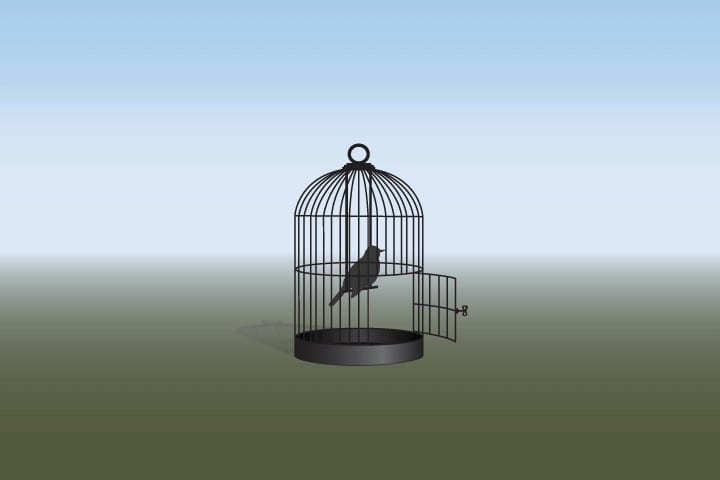Manipulation is Controlled Reality
Healthy skepticism allows us to question claims and promises that there is little or no evidence for – checking any supernatural claim exemplifies healthy skepticism… Intelligent Disobedience+Manipulation is Controlled Reality
Manipulation happens when our beliefs and our experience of reality are controlled by a human predator: an authoritarian or totalist leader, teacher, partner, parent or group. Predators often develop sophisticated methods of recruitment or seduction. No matter how intelligent they are, people will stay if they accept the manipulator’s distorted version of reality. They will think and act in accord with that reality, as the manipulator intends. Escape can come naturally or through the intervention of an outsider.
Human predators are all around us. Charming, manipulative and bullying, they have no feeling or concern for other people, and ruin lives with their lies, their risk-taking, and their rages; Almost anyone can be seduced into a dangerous group or relationship, and all manipulators use startlingly similar methods to lure and entrap us. This article shows why people stay, how people can escape and especially how children get involved.
The Human Predator
Human predators are all around us. Charming, manipulative and bullying, they have no feeling or concern for other people, and ruin lives with their lies, their risk-taking, and their rages.
How People Escape
Some people simply wake up and walk away from a destructive relationship. Some are thrown out, and long to return. Others are talked out, by family, friends or professional counselors. With the right approach, anyone can be helped to reconsider their involvement with a destructive partner or group
Recruitment or Seduction
A History of Manipulation
There have always been human predators. When they control society, there is injustice, violence and war. Sometimes whole nations fall under the spell of a manipulator and a destructive ideology like Nazism. Gangs, terrorist groups and extreme religious cults are all founded on manipulation. Predators use religious belief and unethical laws to control others.
Why People Stay
Once we accept an idea, we often hold on to it stubbornly. A manipulator can use this to cage a well-meaning victim. Even the brightest and best people have been tricked into irrational beliefs and foolish practices by human predators. Doctors, surgeons, astrophysicists, professors and lawyers have been lured into cults. Idealistic people who want to change the world for the better and are dismayed by society’s cynicism are the most likely cult converts.
Luring Children into Abuse
The goal of grooming is to gain trust, so a pedophile will groom both the child and the caregivers. This process, which can take months or even years, uses specific technique.
The Human Predator

Predator Alert
The human predator creates abusive relationships and toxic groups. Predators hunt and trap others. They have no concern for anyone’s welfare except their own.
Warning Signs
Predators are not hard to recognize:
- They are utterly selfish. They pretend friendship and love, but feel absolutely nothing for others.
- Predators are charming and good at flattery, but they don’t mean a word of it.
- They brag and boast and make up outrageous lies. When challenged, they pass the blame.
- Predators are impulsive and easily bored. They demand thrills and take dangerous risks. They enjoy pushing others into taking dangerous risks, too.
- They are bullies with explosive tempers. They enjoy humiliating people. They hate it if anyone else has power or is admired.
- Predators weaken people with insults and putdowns.
- They are cunning and manipulative. They lie easily and think nothing of breaking a promise.
- Predators are without conscience: they do not feel remorse or guilt, and often boast about the harm they’ve done.
- They are lazy and live off others, giving as little as possible in return.
- Predators are control freaks, stopping others from taking control of anything if they can, and forcing petty rules on people – rules that are impossible to follow, because they want to enjoy their sense of control.
- They will boast about breaking the law.
Any of these characteristics is a warning sign. If someone has most of them, then they are a predator. Good people behave badly sometimes, but bad people – predators – behave badly all the time. They mimic friendly behavior, but they could not care less about you or your feelings.
The Science is New
We are only beginning to understand the predatory personality. Although predators pose the greatest threat to society, we must not witch-hunt them. Those who are violent must be kept out of society, but not mistreated. Our overloaded prisons too often allow predators to spread their anti-social, selfish behavior. They corrupt others by creating a cycle of abuse and injury, and leave prison without being rehabilitated.
There is strong evidence that violent psychopaths have under-developed brains, so cannot be held fully responsible for their actions (see Kent Kiehl’s Psychopath Whisperer).
We need to be warned about the potential danger of narcissists, so they should be labeled, and, if possible, educated into understanding their disorder.
We may be at the beginning of a great social transformation. By isolating and recognizing the human predator, we can solve many of our problems. Nothing is more important to human welfare than taking power away from selfish, anti-social people. Please help us to spread the word!
Recruitment or Seduction

We Can Help You With That!
Predatory groups use a powerful mixture of social and psychological techniques for recruitment or seduction of their victims.
The Sales Pitch
Recruitment or seduction into toxic groups and relationships begins with contact, whether in person or through advertising.
The recruiter or seducer often offers something – a pamphlet, joss sticks, flowers or cheap jewelry – so that you’ll offer something back, following the principle of reciprocity.
Friendly rapport is established by agreement and flattery. It is wise to be cautious of any stranger who love-bombs you, or agrees enthusiastically with everything you say.
Seducers and recruiters will often touch you physically to establish rapport. Pick-up artists are taught to touch a target’s hair. Even a handshake can cause a more positive response.
Recruiters for a group may test resistance by mentioning the organization’s name, and then dismissing any negative information, often attacking the source of the criticism, rather than answering the criticism itself: “Oh, you can’t believe anything you read in the papers!”
Exploiting Distress
A recruiter or seducer may exploit your distress, by probing to find out what is upsetting you, or what you long for.
Fear of worsening may be played up: “You’ve tried everything but you know it will only get worse.”
Membership of the group or starting a relationship with the seducer is offered as a solution. As part of a typical sales pitch, a cult recruiter will make up a story about someone who solved a similar problem by taking a course or joining the group.
Techniques are used that lead to a sense of awe – a peak experience. This is strengthened to become fervor or infatuation.
While the targeted person is still high from the peak experience, belief is strengthened by statements of appreciation or written testimonials.
Why People Stay

Social Influence Producing Behavior Change
Why people stay in destructive groups or relationships is often a mystery to people who have never been the victim of a coercive manipulative environment.
We often hold onto beliefs stubbornly. Once we are persuaded by a manipulator, it can trap us into a system of beliefs. Even the brightest and best people have been tricked into irrational beliefs and foolish practices by human predators.
Idealistic people who want to better the world, and are dismayed by society’s cynicism, are the most likely cult converts. Doctors, surgeons, scientists, artists, professors and lawyers have all been lured into cults and abusive relationships: it isn’t about intelligence, poor reasoning skills, or “gullibility”.
Because of consistency, or inertia, we tend to keep moving in the same direction, once we have adopted powerful ideas. Very few people find it easy to change habits and routines.
Predatory people use manipulative techniques to amplify commitment. Robert Cialdini has listed the normal, everyday methods of influence. Robert Jay Lifton observed the deliberate methods of “thought reform”.
Most people believe that they are not vulnerable to predatory influence. They are sure that others “fall” for the tricks of predators, but without knowing those tricks, and recognizing them, we are all vulnerable. We can fervently believe almost any idea, but it is much easier to see others’ faults than our own.
The only group of people – thankfully a small group – who are invulnerable to manipulation are those without emotional responses, without conscience and without any concern for others; and they tend to be the ones using the manipulation.
Irrational and cultic systems have often dominated human thought, even in the sciences. For instance, Behaviorist psychology, which insisted that nothing can be known about the mind or its workings, was dominant in universities in the US for decades, well into the 1970s, when it was shown to be plainly wrong.
A group provides a social environment. Some people remain in an abusive group, because their friends and family will abandon them if they leave.
We are all prone to groupthink, where we go along with the rest of the group. We don’t want to “rock the boat” or cause trouble.
We accept more and more dissonance over time, and our loyalty can keep us stuck. We become used to the language and the routines of any group we belong to, and other groups can seem ever more strange.
Only a significant event will cause someone to reconsider involvement with a group or individual they are loyal to. It can be an unpleasant event, an obvious contradiction, or a revelation of conscience that motivates a challenge to our beliefs. Often the abusive group or partner knows how to overcome disagreement, by playing on guilt, phobia or aversion, and it takes outside help to reconsider the abusive relationship.
How People Escape

How People Escape
Some people walk out of destructive relationships; they simply wake up. Some are thrown out, and long to return. Others are talked out, by family, friends or professional counselors. With the right approach, anyone can be helped to reconsider involvement with a destructive partner or group.
It is important to be supportive when talking with anyone who is trapped in such a relationship: they probably won’t respond to argument or evidence; but we all respond to genuine concern and affection.
When people leave abusive groups and relationships their routines and habits have to change. They will often have been locked into exhausting rituals and behaviors, and will sometimes find themselves in a vacuum, unsure what to do.
Spend time considering the relationship, but balance this with useful and pleasurable activities: it is time to make a new life. A life that fits more closely with your hopes and aspirations.
Escapees must create new bonds and mourn the loss of whoever they have left behind. It is important to find reliable people during this time of transition; people who encourage autonomy and independent decision-making.
Often, an abusive group or individual will ostracize or “shun” the escapee. Many people lose belief in a group, but stay silent, so that their family and friends won’t ostracize them. This means living a double life, which is always difficult.
Without help or expert advice, those who walk out may have a long journey ahead. We recommend Lalich and Tobias’s Take Back Your Life to shorten that journey. Janja Lalich has also co-written Escaping Utopia, which is specifically aimed at second generation members of abusive groups.
To overcome the humiliation of an abusive personal relationship, Susan Forward’s Emotional Blackmail is a useful start. Domineering and controlling people are often human predators.
Among the most difficult relationships to escape are those with borderline personalities, who switch between being kind and supportive, and hostile and undermining. Such people create disorganized attachments and leave their victims feeling guilty rather than wronged.
Thankfully, most people recover with the support of family, friends or former members. If you are struggling after leaving a group or a relationship, find a counselor who understands the group or type of relationship.
There is a distinction between ex-member help groups and counter-cult groups that are active against a high-demand organization. It is usually best to recover before becoming involved in a counter-cult group, or an on-line discussion forum, but recovered former members, or those with similar experiences, can be very helpful to recovery.
Read the experiences of other former members or victims of abusive relationships. Find new interests and mix with new people. Learn about human predators and the techniques of manipulation. Help others to recover, and, when you feel strong enough and have good support, speak out about the abuse you suffered.
History of Manipulation

There have always been human predators. When they control society, there is injustice, violence and war. Sometimes whole nations fall under the spell of a manipulator and a destructive ideology like Nazism. Gangs, terrorist groups and extreme religious cults are all founded on manipulation. Predators use religious belief and unethical laws to control others.
